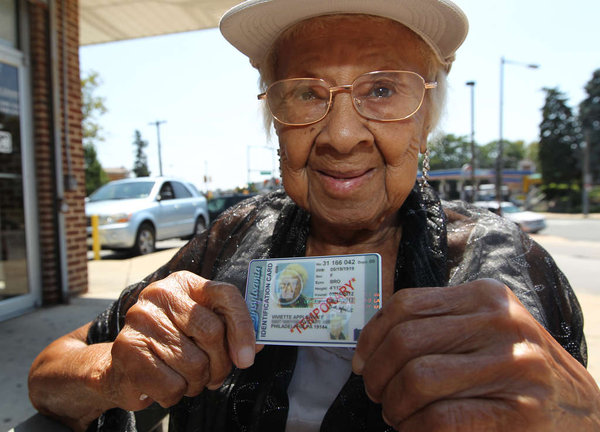Judge Halts Controversial Pennsylvania Voter ID Law


For months, a battle has been raging in Pennsylvania parallel to the presidential race. It is a battle over the rules governing the election itself. With so much at stake this election cycle, party leaders are taking advantage of every opportunity to gain votes. The battle over requirements for photo identification is just another way for the parties to influence the election. The controversial Pennsylvania voter ID law is revolving around two competing claims of election fraud and voter disenfranchisement.
Republicans warn of possible voting fraud, while Democrats dismiss these fears as unfounded and raise the specter of voter disenfranchisement. On Tuesday, Commonwealth Court Judge Robert Simpson ruled that the controversial legislation could not be enforced this election cycle. The latest skirmish in court resulted in a preliminary injunction blocking much of the law. The judge's ruling indicated that the state has yet to resolve the conflict:
"Consequently, I am not still convinced in my predictive judgment that there will be no voter disenfranchisement arising out of the Commonwealth’s implementation of a voter identification requirement for purposes of the upcoming election. Under these circumstances, I am obliged to enter a preliminary injunction."
The ruling specifically halts the requirement for voters to present photo identification at polling places. It does not strike down the law, but simply postpones it.
The enforcement of the requirement could go into effect for the next election cycle, when further activist efforts may quell fears surrounding voter disenfranchisement. Voters may still be asked to show ID, but they are allowed to vote without the requirement of a provisional ballot. Predictably, the decision has been met with both praise and disappointment. Jim Burn, the chairman of the Pennsylvania Democratic Party welcomed the decision in a press release:
"Today is a significant victory in the fight to make sure everyone has the right to vote in November, but the Pennsylvania Democratic Party is remaining vigilant to ensure that voters are educated about the voting process and they are protected when they cast their vote."
Horace Cooper, director of the National Center for Public Policy Research's Voter Identification Task Force, was disappointed, but clarified that the ruling simply reset the timeline on Pennsylvania voter ID reform, "Today's ruling is a temporary setback. Notably, the court's ruling accepts the principle that the voter ID rules are legal. Unfortunately, the timing of the change meant that Pennsylvanians will have to wait one more election cycle before they can be sure their elections are fraud-free."
The effect of the ruling remains somewhat unclear. On the practical side, the state must change its voter education campaign to reflect the ruling. While the judge's ruling was meant to prevent voter disenfranchisement, it may result in some confusion as officials scramble to rewrite their message to voters. The Philadelphia Inquirer reports that Department of State spokesman Ron Ruman said, "With ads to air on roughly 20 network TV affiliates statewide, along with dozens of radio stations, billboards, buses, and websites, it's an uphill battle to pull the plug quickly."
Republicans were hoping the law would help secure the swing state for the presidential election, as the demographic without photo ID is perceived as unfavorable to the Republican cause. Although supporters of the law focus on the threat of election fraud, House Majority Leader Mike Turzai infamously said:
“Voter ID — which is going to allow Governor Romney to win the state of Pennsylvania — done.”
Voters without photo ID will now be allowed to vote, and it appears that the change in the law could only increase voter turnout.
Neil Samuels, executive director of the Bucks Democratic Party, claims that the controversy will create significant backlash, “This voter ID boondoggle was incredibly motivating for some. I know of people who had to go through hurdles and they’re furious about this, and that’s going to drive them to vote.”
On the national stage, Pennsylvania's decision may influence other states that are going through a similar legal challenge. Although the law was blocked temporarily in Pennsylvania, the principle behind it remained unscathed. Some argue this is a victory for the Pennsylvania voter ID requirement. The Heritage Foundation's Hans von Spakovsky gave this analysis:
"While this may seem to be a win for opponents of common-sense election reform efforts like voter ID, it is actually a loss. Pennsylvania was handicapped in implementing its new law by the shortness of time remaining before the election. The court simply found that the state could not effectively implement the ID requirement in only a month. The law is still in place and remains valid."
Whether this result will outweigh the public setback from the temporary injunction is difficult to tell. The conclusion of this case remains to be seen. Next election, the state is likely to face further legal battles as it tries to enforce the ID requirement. For now, however, Pennsylvanians must turn their attention to the issues and the candidates, and decide who will hold the reins of power. The Pennsylvania voter ID controversy is a reminder that voters are not simply choosing between ideas, they are choosing the politicians who have the power to change the rules of the game itself.



